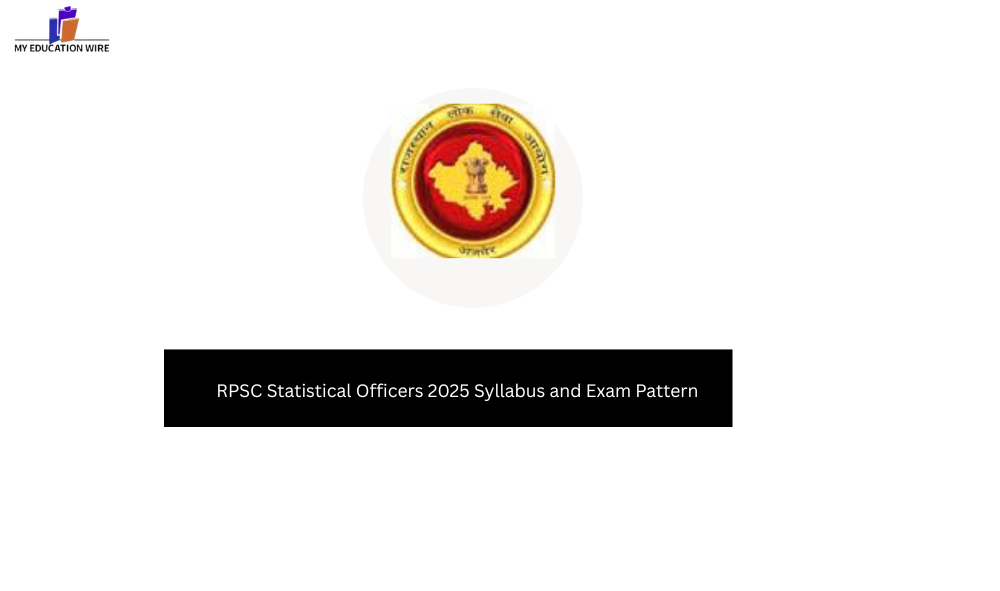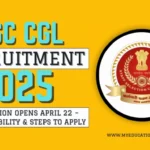RPSC Statistical Officers Exam Pattern and Syllabus 2025-The application form will open on October 28 for Statistical Officers. Candidates will be able to apply then on the official website.
How would you prepare for the exam so that you get your desired job? The vacancy details provided below according to the category
Table of contents
RPSC Statistical Officer Vacancy 2025 Overview
| Particular | Details |
| Organization | Rajasthan Public Service Commission (RPSC) |
| Department | Economics and Statistics (Planning Dept.), Government of Rajasthan |
| Post Name | Statistical Officer (SO) |
| Advertisement No. | 11/Exam/S.O.(Statistics Deptt.)/RPSC/EP‑I/2025‑26 |
| Total Vacancies | 113 Posts |
| Application Period | 28 October 2025 – 26 November 2025 |
| Exam Mode | Offline (OMR) Objective Type |
| Selection Process | 1) Written Examination 2) Document Verification 3) Medical Exam |
| Pay Level | Pay Matrix Level‑12 (GP ₹ 4800) |
Category‑wise Break‑up of 113 Seats (As per RPSC Notification 2025)

| Category | No. of Posts |
| General (UR) | 42 |
| OBC | 24 |
| EWS | 10 |
| SC | 18 |
| ST | 14 |
| MBC | 05 |
| Total (Approx.) | 113 Posts (Reservation benefits as per Rajasthan Government Rules) |
RPSC Statistical Officer Application form and vacancies
Exam Pattern
RPSC Statistical Officer 2025 Exam PatternPart Section No. of Questions Marks Duration Part A General Knowledge of Rajasthan 40 40 2 hours 30 minutes (150 minutes) Part B Statistics, Economics and Mathematics 110 110 Total 150 150 marks 2 hours 30 minutes
- Each question carries 1 mark.
- Objective‑type (MCQ) questions.
- 1/3 negative marking for incorrect responses .
- The written test is followed by an interview and document verification.
Detailed Syllabus
Part A – General Knowledge of Rajasthan
- Geography & Economy: Physiographic divisions, resources (minerals, water, power, forests), farming, and economic development schemes.
- History & Culture: Major dynasties, freedom movements, folk arts, literature, festivals, and heritage sites.
- Current Affairs: Latest developments in Rajasthan and India in technology, governance, and social schemes .
Part B – Statistics, Economics and Mathematics
1. Descriptive Statistics
- Data collection, classification & tabulation.
- Measures of Central Tendency & Dispersion (mean, median, mode, SD, variance).
- Moments, Skewness & Kurtosis.
- Correlation (Pearson, Spearman) and Regression Analysis .
2. Probability & Probability Distributions
- Classical & Axiomatic probability, Bayes’ Theorem.
- Random variables and mathematical expectation.
- Binomial, Poisson, Normal, Gamma, and Beta distributions and their applications.
- Central Limit Theorem .
3. Sampling Theory and Estimation
- Population & sample concepts: Census vs sample survey.
- Methods of sampling (Simple Random, Stratified, Systematic, Cluster, Multistage).
- Sampling errors, consistency, bias, and efficiency.
- Point & interval estimation, ML and Method of Moments estimators .
4. Testing of Hypothesis
- Hypothesis types and errors (Type I, II).
- Large & small sample tests (Z, t, χ², F).
- Confidence intervals and p‑value interpretation .
5. Design of Experiments & Surveys
- Principles of Experiment Design (Randomization, Replication, Local Control).
- CRD, RBD, and Latin Square Designs (analysis & application).
- Factorial experiments and Analysis of Variance (ANOVA).
- Construction and implementation of sample surveys .
6. Time Series & Forecasting
- Components of time series (Trend, Seasonal, Cyclical, Irregular).
- Methods of measuring trend: Moving average & Least Squares.
- Forecasting & demand estimation models .
7. Multivariate & Applied Statistics (Advanced Topics)
- Multiple Regression & Multicollinearity.
- Principal Component and Factor Analysis.
- Discriminant Functions & Hotelling’s T² Test.
- Non‑parametric tests: Run Test, Sign Test, KS‑Test .
8. Economics & Mathematical Methods
- National income, inflation, monetary policy, and public finance.
- Basic algebra, calculus, and matrices; optimization techniques.
- Statistical applications in economic planning and development .
Selection Process Weightage (2025 Pattern)
| Stage | Components | Weight |
| Screening Test | Objective Questions (150 Marks) | 60% |
| Academic Merit | (Graduation + PG) | 20% |
| Interview | Oral Assessment & Personality Test | 20% |
Final selection will be based on aggregate performance across all three stages.
Recommended Preparation Strategy
- Prioritise Statistics (60–65%) and Mathematical Techniques (20%), keeping Rajasthan GK (15%) for Part A.
- Refer to standard texts such as:
- Fundamentals of Mathematical Statistics – Gupta & Kapoor.
- Sampling Techniques – W.G. Cochran.
- Principles of Economics – Mankiw.
Summary
- Exam Type: Objective (150 MCQs) - Marks: 150 - Duration: 2 hr 30 min
- Sections: Rajasthan GK (40 marks) + Statistics/Economics/Maths (110 marks)
- Negative Marking: 1/3 per wrong answer
- Next Stage: Interview & Academic Merit evaluation
For the RPSC Statistical Officer Examination 2025, candidates should focus on books covering Statistics, Economics, Mathematics, and Rajasthan General Knowledge aligned with the official syllabus. The following books and authors are widely recommended in current preparation guides .
Core Statistics and Mathematical Methods
| Subject | Recommended Book | Author(s) | Key Use |
| Statistical Methods | Statistical Methods | R. S. N. Pillai & Bagavathi | Comprehensive theory & practice of applied statistics — suited for descriptive, sampling & estimation topics . |
| Fundamentals of Statistics | Fundamentals of Mathematical Statistics | S. C. Gupta & V. K. Kapoor | The most referenced text for RPSC SO covering correlation, regression, probability & testing methods . |
| Probability & Inference | A First Course in Probability and Statistics | Sheldon Ross | Ideal for foundational probability, Poisson and normal distributions . |
| Advanced Techniques | Advanced Statistics | H. B. Mann & A. M. Wald | Covers higher‑level distributions, estimation and ANOVA models . |
| Applied Statistics | Statistics for Management | Richard I. Levin & David S. Rubin | Management and business application of statistical methods, beneficial for economic planning sections . |
| Theory & Practice | Theory and Practice of Statistics | R. G. Bansal | Simplified approach with examples useful for non‑mathematics background students . |
Subject Wise Books
Economics and PlanningSubject Book Author Indian Economy Indian Economy Ramesh Singh Rajasthan Economy & Development Rajasthan Arthvyavastha Evam Vikas Rajesh Kumar Verma
Mathematical TechniquesTopic Book Author Mathematical Statistics & Calculus Fundamentals of Applied Mathematics B. S. Grewal Design of Experiments & Regression Design of Experiments and Sampling Theory W. G. Cochran
Rajasthan General Knowledge (Part A)Topic Book Author Notes Rajasthan History, Culture & Geography Rajasthan Samanya Gyan Dr. Rakesh Yadav Concise coverage of Rajasthan’s GK and current affairs . Rajasthan GK Rajasthan General Knowledge Dinesh Kumar Bhandari Popular for fact‑based state questions and geography maps . Rajasthan Politics & Schemes Rajasthan Ki Rajniti M. L. Khichar For questions on state governance and administrative institutions . Current Affairs (2024–25) Current Affairs Rajasthan Ramesh Singh Monthly updates useful for Part A.
Comprehensive Guides & Practice SetsResource Name Publisher Features RPSC Statistical Officer Preparation Guide 2025 Edition Jet Exam Publication Theory, practice MCQs, key formulas and mock tests. Assistant Statistical Officer (ASO) Set of 8 Books Utkarsh Classes Hindi medium complete set covering Rajasthan GK, Economy, Mathematics, Computers and previous papers. RPSC Statistical Officer Statistics Book 2025 Fawo Books Full coverage per latest syllabus, topic‑wise practice tests with solutions. RPSC Assistant Statistical Officer Exam Guide Prof. M. K. Agrawal (Garima Publication) Hindi medium reference, simplified formula lists, and sectional tests.
Preparation Tips
- Start with Concept Books like Gupta & Kapoor and Levin & Rubin for Statistics basics.
- Build numerical accuracy and confidence using practice sets from Utkarsh or Jet Exam Guide.
- Revise formulas and graphs weekly and solve previous year MCQs.
- Use Ramesh Singh and state GK books for current affairs and economic applications.






